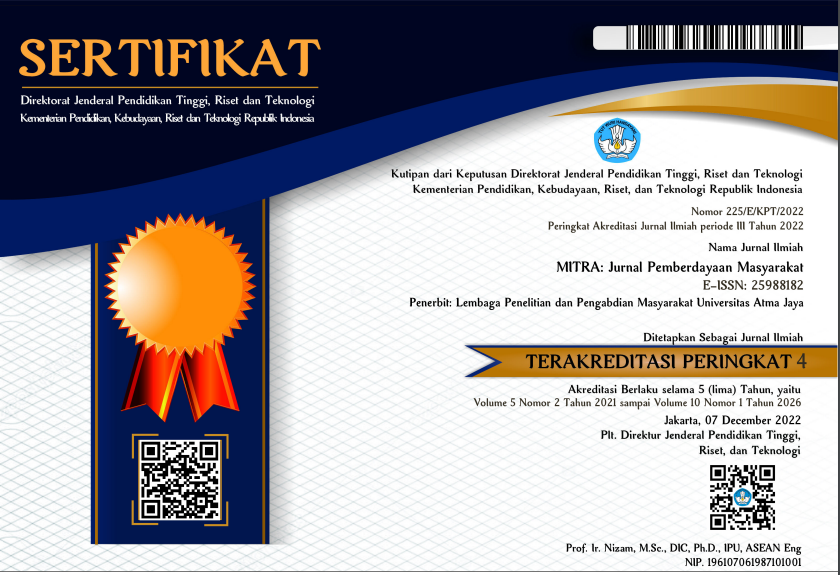Building up Teacher’s Awareness about Burnout to Support Mental Health
DOI:
https://doi.org/10.25170/mitra.v6i2.3251Keywords:
burnout, teacher, psychoeducation, online seminarAbstract
Teacher’s job requirements are not only in teaching but also in social interaction and administrative tasks and various knowledge and other supporting skills. High job demands and the dynamic experiences that teachers need to accomplish everyday could make them prone to burnout. Teachers under the organization of Majelis Pendidikan Indonesia (MPK) had unique characteristics and challenges that made them prone to burnout. This psychoeducation was needed to achieve the aim of building knowledge about burnout and all other aspects related to burnout. It was hoped that this knowledge could help teachers prevent the occurrence of burnout. With methods of presentations and online interactive discussion, the presenter discussed some of the things that can be done at an organizational level and individually. The comparison of the pre-test and post-test score showed an increase of understanding (the average of pretest score is 72.24 and posttest score is 77.67 of 100) of the materials around burnout and its aspects. Participants also gave positive feedback on an evaluation survey with 94% of the participants felt that they gained new knowledge and felt satisfied with the whole psychoeducation activities. For following up, it was suggested to include a method of small group discussion and included a practical manual about techniques for overcoming burnout for teachers. Furthermore, the systemic intervention urge to be done to develop burnout intervention service flow becomes more comprehensive.
References
Atmaca, Ç., Rızaoğlu, F., Türkdoğan, T., & Yaylı, D. (2020). An emotion focused approach in predicting teacher burnout and job satisfaction. Teaching and Teacher Education, 90(1), 1-13. https://doi.org/10.1016/j.tate.2020.103025
Chen, H., Liu, F., Pang, L., Liu, F., Fang, T., Wen, Y., Chen, S., Xie, Z., Zhang, X., Zhao, Y., & Gu, X. (2020). Are you tired of working amid the pandemic? The role of professional identity and job satisfaction against job burnout. International Journal of Environmental Research and Public Health, 17(24), 9188. https://doi.org/10.3390/ijerph17249188
Cheptea, D., Deleu, R., Mesina, V., Friptuleac, G., & Cebanu, S. (2021). Assessment of burnout among teachers during the covid-19 pandemic. Archives of the Balkan Medical Union, 56(2), 179-184. https://doi.org/10.31688/ABMU.2021.56.2.06
Ekawanti, S., & Mulyana, O. P. (2016). Regulasi diri dengan burnout pada guru. Jurnal Psikologi Teori dan Terapan, 6(2), 113-118. https://doi.org/10.26740/jptt.v6n2.p113-118
Ezenwaji, I. O., Eseadi, C., Okide, C. C., Nwosu, N. C., Ugwoke, S. C., Ololo, K. O., Oforka, T. O., & Oboegbulem, A. I. (2019). Work-related stress, burnout, and related sociodemographic factors among nurses. Medicine, 98(3), e13889. https://doi.org/10.1097/md.0000000000013889
Fahmi, A. Z., Muthia, W. S., Alfarizi, F., Garlianka, M., Wangsadikrama, & Widiasmara, N. (2019). Kebersyukuran dan burnout pada guru sekolah dasar di Yogyakarta. Psikologika: Jurnal Pemikiran dan Penelitian Psikologi, 24(2), 105-114.
Harususilo, Y.E. (2021). Mengenal gejala dan dampak “burnout pada guru”. https://www.kompas.com/edu/read/2021/06/21/113933471/mengenal-gejala-dan-dampak-burnout-pada-guru., diakses Okt 03, 2022.
Majelis Pendidikan Kristen Indonesia. (2022, September 23). http://mpk-indonesia.org, diakses October 3, 2022
Maslach, C., & Leiter, M. P. (2016). Understanding the burnout experience: Recent research and its implications for psychiatry. World Psychiatry, 15(2), 103-111. https://doi.org/10.1002/wps.20311
Maslach, C. (2017). Finding solutions to the problem of burnout. Consulting Psychology Journal: Practice and Research, 69(2), 143–152. https://doi.org/10.1037/cpb0000090
Nadyastuti, S., Mularsih, H., & Triatri, S. (2021). Mengenal gejala dan dampak burnout pada guru. https://www.kompas.com/edu/read/2021/06/21/113933471/mengenal-gejala-dan-dampak-burnout-pada-guru?page=all%0A
Oberle, E., Gist, A., Cooray, M. S., & Pinto, J. B. R. (2020). Do students notice stress in teachers? Associations between classroom teacher burnout and students’ perceptions of teacher social–emotional competence. Psychology in the Schools, 57(11), 1741-1756. https://doi.org/10.1002/pits.22432
Poghosyan, L., Aiken, L. H., & Sloane, D. M. (2009). Factor structure of the Maslach burnout inventory: An analysis of data from large scale cross-sectional surveys of nurses from eight countries. International Journal of Nursing Studies, 46(7), 894-902. https://doi.org/10.1016/j.ijnurstu.2009.03.004
Poghosyan, L., Aiken, L. H., & Sloane, D. M. (2014). Corrigendum to “Factor structure of the Maslach burnout inventory: An analysis of data from large scale cross-sectional surveys of nurses from eight countries” [Int. J. Nurs. Stud. 46 (2009) 894-902]. In International Journal of Nursing Studies, 51 (10), 1416-1417 . https://doi.org/10.1016/j.ijnurstu.2014.02.013
Pressley, T. (2021). Factors contributing to teacher burnout during covid-19. EducationalResearcher, 50(5), 325–327. https://doi.org/10.3102/0013189X211004138
Rahman, U. (2007). Mengenal Burnout pada Guru. Lentera Pendidikan: Jurnal Ilmu Tarbiyah dan Keguruan, 10(2), 216-227. https://doi.org/10.24252/lp.2007v10n2a7
Ratanasiripong, P., Ratanasiripong, N. T., Nungdanjark, W., Thongthammarat, Y., & Toyama, S. (2021). Mental health and burnout among teachers in Thailand. Journal of Health Research, 36(3), 404–416. https://doi.org/10.1108/JHR-05-2020-0181
Saloviita, T., & Pakarinen, E. (2021). Teacher burnout explained: Teacher-, student-, and organisation-level variables. Teaching and Teacher Education, 97(2021),103221. https://doi.org/10.1016/j.tate.2020.103221
Sánchez-Pujalte, L., Mateu, D. N., Etchezahar, E., & Gómez Yepes, T. (2021). Teachers’ burnout during covid-19 pandemic in Spain: Trait emotional intelligence and socioemotional competencies. Sustainability (Switzerland), 13(13), 7259. https://doi.org/10.3390/su13137259
Shen, B., McCaughtry, N., Martin, J., Garn, A., Kulik, N., & Fahlman, M. (2015). The relationship between teacher burnout and student motivation. British Journal of Educational Psychology, 85(4), 519-532. https://doi.org/10.1111/bjep.12089
Skaalvik, E. M., & Skaalvik, S. (2010). Teacher self-efficacy and teacher burnout: A study of relations. Teaching and Teacher Education, 26(4), 1059-1069. https://doi.org/10.1016/j.tate.2009.11.001
Tarrant, K., & Nagasawa, M. (2020). Executive summary: New York early care and education survey: Understanding the impact of covid-19 on New York's early childhood system. New York Early Childhood Professional Development Institute, CUNY. https://educate.bankstreet.edu/sc/4
Yandri, H., & Juliawati, D. (2017). Burnout pada guru BK/konselor sekolah. Konselor, 6(2), 61-65. http://dx.doi.org/10.24036/02017627561-0-00
Downloads
Published
Issue
Section
License
Copyright (c) 2022 Lita Patricia Lunanta, Reneta Kristiani, Gracia Samuela Kiswanto, Renata Raissa Sondakh

This work is licensed under a Creative Commons Attribution-NonCommercial-ShareAlike 4.0 International License.
This license allows reusers to distribute, remix, adapt, and build upon the material in any medium or format for noncommercial purposes only, and only so long as attribution is given to the creator. If you remix, adapt, or build upon the material, you must license the modified material under identical terms.



_.jpeg)

.png)
2.png)
.png)
.png)



